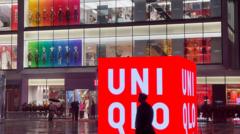The chief executive of Fast Retailing, Tadashi Yanai, has publicly stated for the first time that Uniqlo does not utilize cotton sourced from the Xinjiang region of China, as reported in an exclusive interview with the BBC. This assertion comes amidst increasing scrutiny over human rights violations associated with cotton production in the region, where forced labor of the Uyghur minority has raised significant ethical concerns.
China represents a vital market for Uniqlo, which operates roughly 1,000 stores in the country, making it an indispensable part of the brand’s retail and manufacturing strategy. Historically, Xinjiang cotton has been recognized for its quality; however, due to the recent revelations surrounding its production methods, many international brands, such as H&M and Nike, have enacted measures to remove Xinjiang cotton products to avoid backlash and comply with new stricter regulations from the United States.
Previously, Yanai was non-committal regarding Uniqlo's use of Xinjiang cotton. He stated, "I want to be neutral between the US and China," a position that safeguarded Uniqlo's popularity in the Chinese marketplace amidst increasing tensions. Yet, Yanai's recent comments indicate a shift toward greater transparency regarding the company’s supply chain practices, albeit with caution to avoid increasing political entanglement. He noted, “We’re not using [cotton from Xinjiang].” However, when pressed for further details, he hesitated, indicating the sensitivity surrounding the issue.
Industry analysts, such as Isaac Stone Fish, founder of Strategy Risks, underscore the dilemma faced by multinationals in today’s charged political atmosphere, indicating that major companies can no longer afford to maintain political neutrality due to pressures from both Beijing and Washington.
Despite challenges posed by rising competition from ultra-fast fashion brands like Shein and Temu, Yanai remains committed to Uniqlo's strategy of producing quality, essential clothing that can withstand rapid changes in consumer trends. He also expressed the ambition of increasing Uniqlo's presence in China, citing a potential expansion of stores to 3,000, emphasizing that the market of 1.4 billion offers vast opportunities.
As Uniqlo continues to diversify its manufacturing locations beyond China, Yanai reflects on the challenges of replicating China’s successful production environment in other countries like Bangladesh and Vietnam, citing cost and experience as crucial factors. With growing global scrutiny around labor practices, particularly in light of human rights issues, Uniqlo's future endeavors may be further complicated by escalating tariffs, especially with potential shifts in U.S. trade policies under a new administration.
Overall, Yanai's statements highlight the intricate balance of ethical sourcing, market strategy, and geopolitical dynamics faced by global retailers operating across regions with vastly different operational standards and consumer expectations.




















